Preface Over 600 IDPs, mostly from Hama eastern countryside, reside Ekhwet Sa'dah Camp, fleeing the hell of fight between the Syrian regular forces and armed opposition factions took place in late 2017[1]. They had no option but to displace and live in tents under intolerably difficult conditions with the lack of any health center or even a school, which threatened more 150 children with ignorance and illiteracy.
No humanitarian or sponsoring organizations oversee the camp, the Administration of the Displaced Affairs of the Salvation Government[2], however, distributes some food aids and provides vaccines infrequently, leaving residents suffering scarcity of food for long, since there are rare job opportunities which made the IDPs face tremendous difficulties to make their livings, added to being unable to take any of their belongings when they flee their hometowns. The majority of camp tents tore and the IDPs cannot afford new ones, which forced many to sleep in the open. The approaching winter became the people’s concern, according to STJ field researcher.
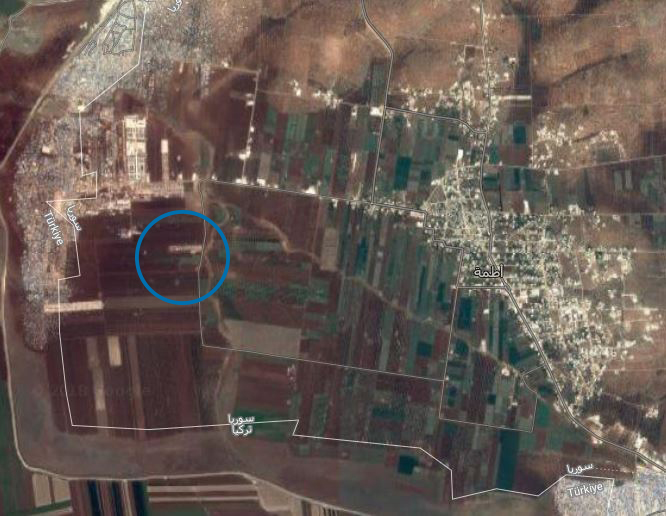
A satellite image illustrates the approximate location of Ekhwet Sa'dah Camp located in northern Idlib countryside.
First: Catastrophic Humanitarian Conditions and a Total Absence of Sponsoring Organizations
Ekhwet Sa'dah Camp lies west of Atma town at the Syrian-Turkish border. It houses more than 600 IDPs on estimated 19 km2. The people residing there suffer from extremely grave humanitarian conditions, according to Aboud Basem, one of the camp officials, who told STJ:
"IDPs living dire humanitarian circumstances; tents are too few and almost all of them torn, each tent houses more than two families which means that the tent might house more than ten individuals. The camp needs enough toilet facilities to serve all residents because some of them compelled to defecate in the open. Moreover, to get to the highway is absolutely difficult especially in winter, as the land turn into mud by the rain since it is agricultural. The most crucial is that the camp lacks a health center within or nearby; many people cannot afford going to the far one." Aboud Basem stated.
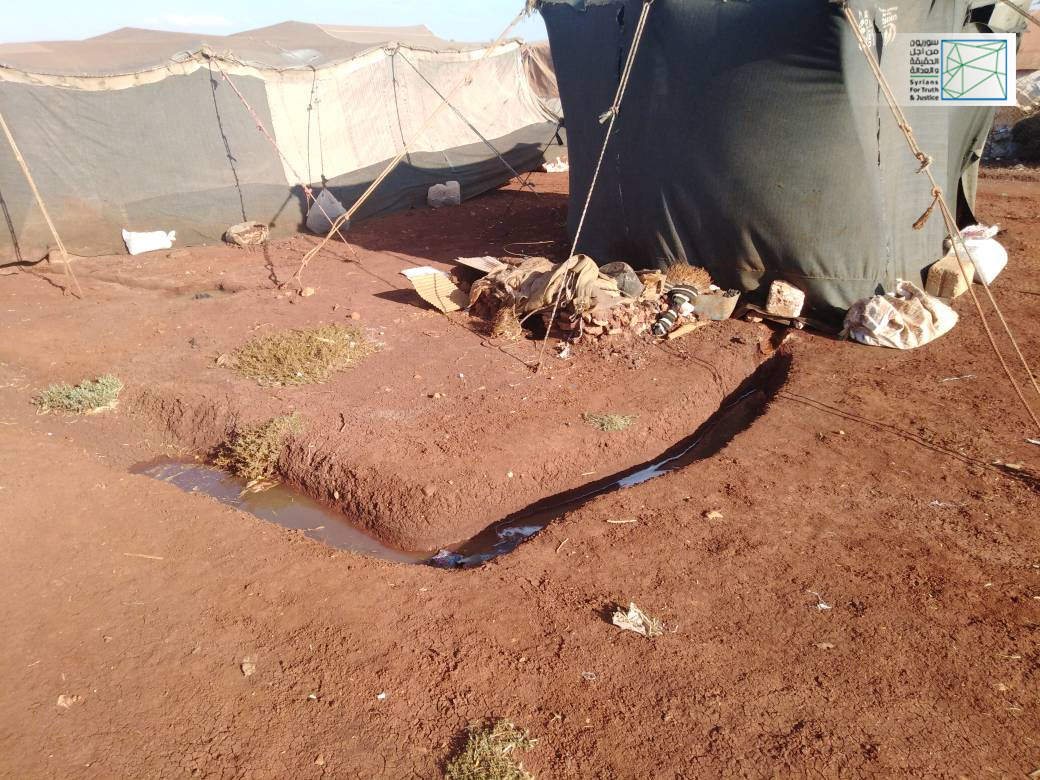
A tent in the Ekhwet Sa'dah Camp. Taken early September 2018.
Photo credit: STJ
Regarding education, Basem reported that it is as bad as other camp services, as there is no school to teach reading and writing basics, which warn a catastrophe that must be redressed. More than 150 children, mostly between 10 and 14, are completely illiterate; they received no education in their hometowns since late 2017, given the continuous shelling which led parents not to send their children to schools. Eventually, when they came to Ekhwet Sa'dah Camp, no humanitarian organization afforded care or support for the education process despite the numerous appeals made by residents. He added:
"We’ve told the concerned parties and organizations several times that there are youths within the camp of all specializations who could start teaching the children if they obtained the required support, including the equipping of a large tent with desks, boards and stationary besides paying them salaries. Ignorance started to prevail among the children which is greatly threaten their future." Basem added.
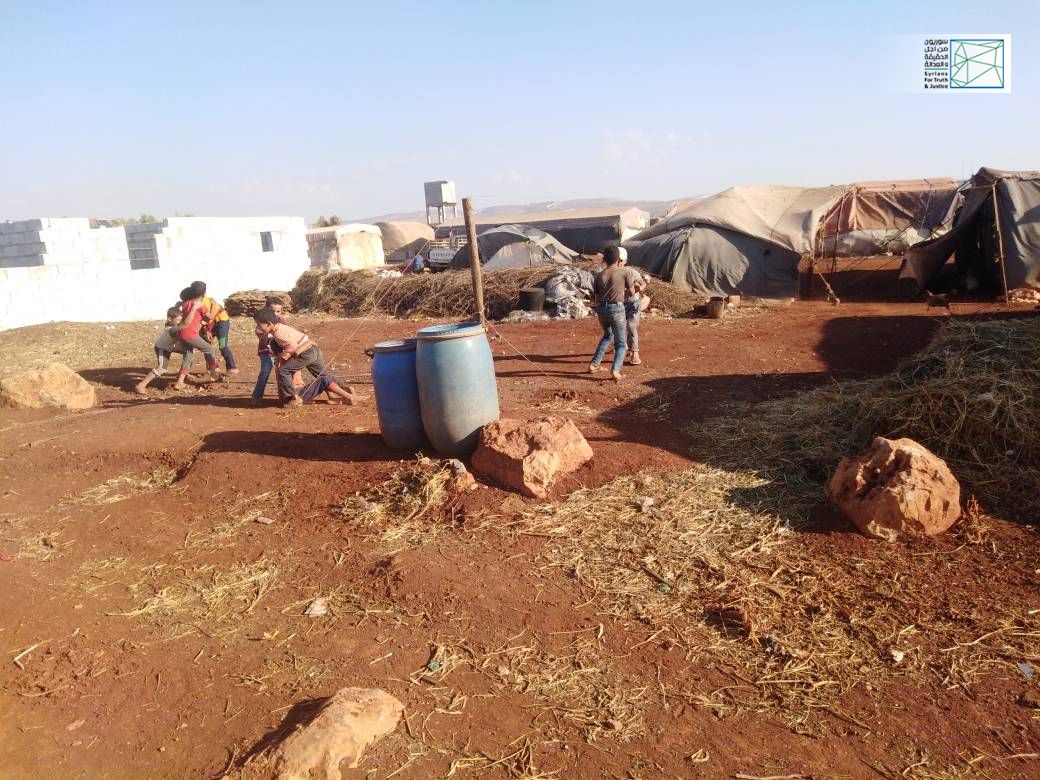
A side of Ekhwet Sa'dah Camp. Taken early September 2018.
Photo credit: STJ
Second: “Sleeping on the ground without a roof over their heads”
Abu Nae'em, a resident in Ekhwet Sa'dah Camp, testified to STJ that the majority of IDPs in the camp flee from Hama eastern countryside, following heavy fighting between the armed opposition factions and the Syrian regular forces, which resulted in the latter’s control over the area and the displacement of its people, in late October 2017, without being able to take any of their belongings due to intense shelling. He said:
"More than 600 locals were displaced from Hama eastern countryside to Atma at the Syrian-Turkish border, where the landlords asked them for money in exchange for allowing them set up tents, which was really difficult for IDPs since they had nothing. After several attempts, however, the camp was established in return for about SYP 100,000, for each single dunum, which was a reasonable amount. We, IDPs, managed to collect the required amount, and got second-hand tents, since we could not afford new ones, and we received no support from any humanitarian organization."
Abu Nae'em added that residents of the camp went through hell in winter, as the tents do not resist storms or rains and the land on which they erected is an agricultural, which turns into mud after rain and make it really hard to walk the long distance to the highway with the absence of any kind of transportation. Regarding the IDPs’ concerns about the consequences of the approaching winter, he reported,
"Many of the tents in the camp are no longer fit for accommodation, lots of IDPs are compelled to sleep in the open, waiting for any kind of assistance. With regard to education, it is "absolutely poor"; dozens of children do not know how to read or write though they are over 13. We called upon relief organizations and institutions to establish a nearby school so that children can get access to education but nobody cared. The majority of the children in the camp are ignorant and illiterate which threaten their future. We appeal all the children organizations and institutions to give every consideration to the camp’s deplorable state which does not grab the headlines."
Third: None of my Children knows how to read or write
Mohammed Omar al-Dukhi, a resident in Ekhwet Sa'dah Camp, had displaced along with his wife and five children, late 2017, following the Syrian regular forces’ capture of eastern Hama countryside. His children could not exercise their right to education. In this regard, he told STJ:
“I’ve displaced from Hama eastern countryside like hundreds others, as a result of the violent battles between Regime forces and armed opposition factions. Many people displaced to refugee camps northern Syria. For me, I came to this small camp with my wife and five children whom I couldn’t send to school in our hometown given the indiscriminate bombing. Our situation now is not better than before, we are facing more hardships added to the harsh living and the deteriorated financial situation, children here have no access to education, they spend all the time playing, know nothing about their bleak future.”
Al-Dukhi’s five children are of school age; Zahraa al-Dukhi, 13, Asma and Israa (twins), 11, Mostafa al-Dukhi ,9 and Do'aa al-Dukhi, 7. All of them have no access to education just like other children within the camp. He goes on to say:
"Everybody here calling for school establishment. I really fear for the future of my children; I want them to occupy decent jobs in the future. My daughter Zahraa, is the eldest among her siblings, she spends time helping her mother or playing with her friends. She usually tries in vain to read some simple words written here and there. She complains feeling that she has the right to receive education just like other children in the world."
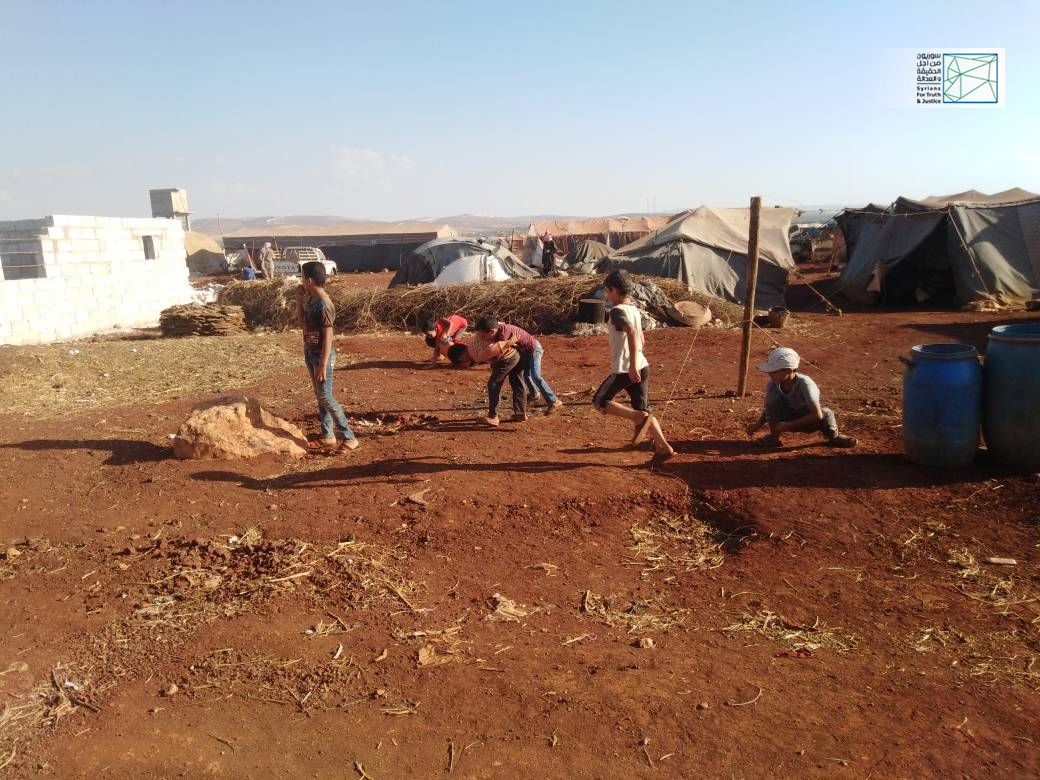
A side of Ekhwet Sa'dah Camp. Taken early September 2018.
Photo credit: STJ
Fourth: “It’s my fate never to be a Surgeon as I’ve always dreamed”
Anas Ahmad al-Saqqar,13, from Samiriyeh village in Hama eastern countryside, is one of many children displaced with their families to Ekhwet Sa'dah Camp in late 2017, to escape the deadly barrage.
Anas received education for only three months before the war forces him out his village. He spoke to STJ about the hardships they are facing:
"I’ve always dreamed to be a surgeon, but now it became impossible. I felt so happy when I first go to school and started learning reading and writing in 2013, but alas, I dropped out after only three months when my father decided to flee the village because of the unbearable conditions. We displaced to Tarfawi village, Idlib eastern countryside, and stayed there for a year and a half living in an uninhabitable house, which belongs to one of our relatives, I was sad and depressed then, because of not being able to pursue my education. We returned to our village, Samiriyeh, but unfortunately, we couldn’t stay there more than four months, through which we were obliged to flee bombardment and be back every other day until we displaced again to the nearby Ablah village, where we live in agony for 6 months before we back to our village when the situation calmed, we stayed there until 2016 through which I receive no education because the school was not operated since it was not equipped or assisted from the Ministry of Education of the Syrian regime nor the Salvation Government. Eventually we displaced to Ekhwet Sa'dah Camp."
Anas' grief increases day by day because he got no education like other children and because there is no school within the camp where he can spend his time and learn how to read and write. He said:
"I was shocked to learn from the children in the camp that they went through the same circumstances I had, which also precluded their education. I really hope the camp officials establish a school so that we can learn reading and writing basics. Studying medicine is no longer my concern, hardships overwhelmed my dreams.” He commented.
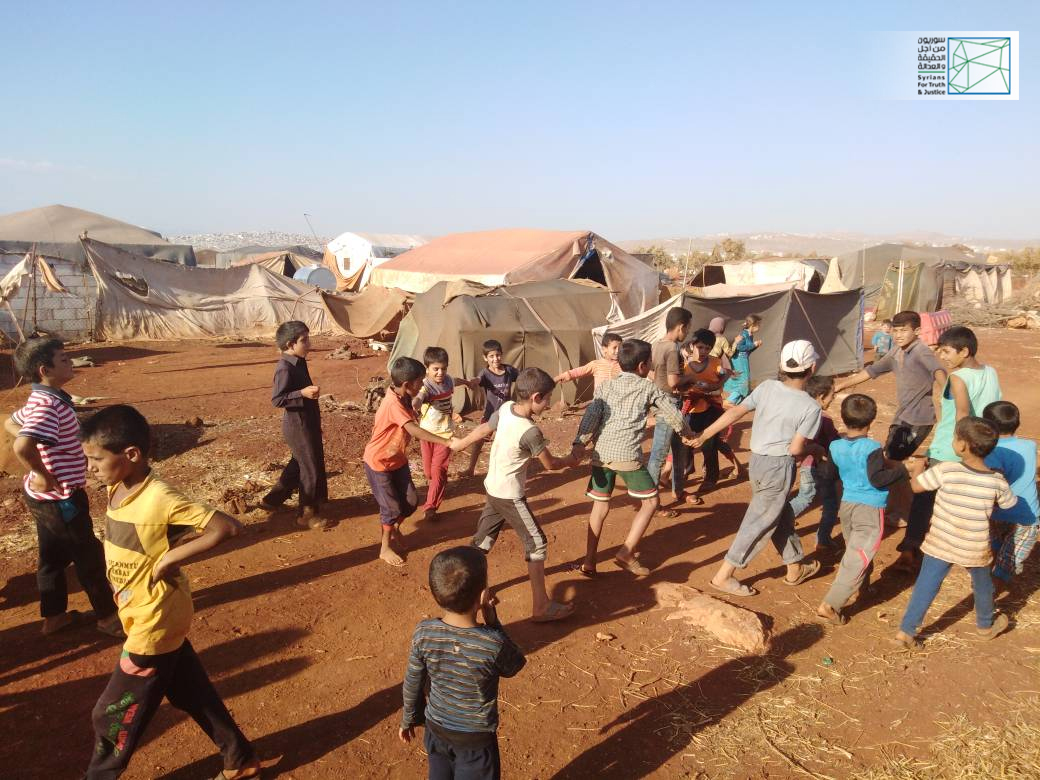
A side of Ekhwet Sa'dah Camp. Taken early September 2008.
Photo credit: STJ
[1] The Syrian regular forces managed to capture the east countryside of Hama late 2017.
[2] On October 7th 2017, the establishment of Salvation Government was announced to administer Idlib province and the areas controlled by Hayat Tahrir Al Sham-HTS. It was emerged from “Statutory Body” that in turn was emerged from “Syrian General Conference” that HTS convened on September 17th 2017. All sessions and the sessions of forming the government were held in Bab Al Hawa crossing point, on the Turkish border.
[3] "Idlib: Thousands of IDPs living Catastrophic Humanitarian Conditions in Refugee Camps", STJ, August 28, 2018, last visit September 13, 2018, https://www.stj-sy.org/en/view/700

